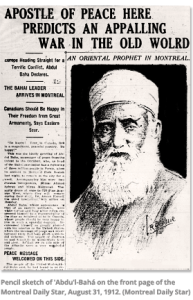He was a big story in 1912, but aside from the Baha’i community and its friends, few remember ‘Abdu’l-Baha Abbas. For 239 days, he travelled about North America to considerable acclaim: he was heralded in newspapers from Montreal to San Francisco, New York to Chicago as an “Oriental Seer”, the “Baha’i Prophet”, as a “Wonderful Persian Mystic” and “Apostle of Peace”. He gave hundreds of talks in synagogues, churches, universities, public auditoriums and private homes. His topics were many, but the central core of his message was one of spiritual awakening, the hard but necessary road to global peace, and the essential oneness of all faiths, races and peoples. Imagine: 1912.
On May 3, ‘Abdu’l-Baha (it means something like “servant of the Glory”) spoke at the Hotel Plaza in Chicago. He analyzed what factors led to the advancement of civilization and the living of an ethical, productive life. He pointed towards what he called “universal educators”, those historical sources of spiritual, intellectual and material guidance around whom whole systems of belief and practice have arisen. Given where he was, Jesus Christ was his main example.
The quote below almost seemed a throwaway line given at the end of the talk. However, when we consider all that has been and is done in the name of national self-interest, of “my country right or wrong”, of imperialism and cultural superiority and insistent inequality, it’s a deep and weighty challenge. Where do we look for truth? Well, not there:
“We must not look for truth in the deeds and actions of nations; we must investigate truth at its divine source and summon all mankind to unity in the reality itself.”
‘Abdu’l-Bahá (1844-1921) did not accept the title of “prophet”. He claimed only to be a servant, a sharer of the message of Baha’u’llah, the 19th-century founder of the Baha’i Faith. By any account, his was one of the most exemplary and profound lives of the 20th century; by mine, he was the outstanding personage of our age.

